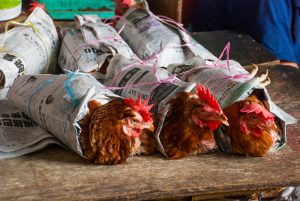Yesterday, I wrote a short article about the proposed formation of a rice export cartel between Thailand and Vietnam, which I described as just the latest sign of a turn toward protectionism and market interventions in the context of soaring global food prices.
Today brought another example of this trend, with Malaysia beginning a ban on the export of live chickens, to bolster domestic supplies and hold down surging prices.
Last week, Malaysian Prime Minister Ismail Sabri Yaakob announced that the country would halt exports of 3.6 million chickens a month from June 1. Ismail Sabri added that the Malaysia Competition Commission will also open investigations into reports that there are cartels that control the price and output of chicken among large companies.
He said that the ban would be in place “until domestic prices and production stabilize,” adding, “The government’s priority is our own people.”
In recent weeks, Malaysia, which imports around 60 percent of its food needs, has seen rising food prices due to rising global commodity prices and a weakening ringgit. According to Malaysian farmers, the rising prices of chicken are the result of the growing cost of chicken feed, which is in turn connected to a grain shortage caused by Russia’s invasion of Ukraine. As a result, some retailers have had to resort to rationing the sales of chicken.
The export ban is likely to affect a number of Asian nations, but none as much as import-dependent Singapore, which last year sourced about 34 percent of its chicken from Malaysia. Almost all of these imports were live chickens that were slaughtered and chilled in Singapore. The Straits Times cited chicken sellers as saying that the cost of raw chicken could rise by up to 30 percent, sending the price of the city-state’s toothsome chicken rice dish spiraling upward.
Yesterday, a day ahead of the ban, Channel News Asia observed long queues at hawker centers across the city-state yesterday, while the impending shortage has prompted the COVID-19-style panic-buying of chicken from wet markets and supermarkets.
As well as signifying the increasing global turn toward protectionism, which also included a temporary Indonesian palm oil export ban and Indian restrictions on sugar and wheat exports, the chicken export ban highlights Singapore’s vulnerabilities to disruptions in the global food supply. Due to its dearth of arable land, the vast majority of the nation’s food – north of 90 percent, according to the Singapore Food Agency (SFA) – is imported, leaving it exposed to external shocks.
After Malaysia announced the export restrictions last week, the SFA said it was working to minimize the impact on supply by tapping other sources of imports. According to SFA data cited by Channel News Asia, other major sources of chicken for Singapore include Brazil (49 percent) and the United States (12 percent). “While there may be temporary disruptions to the supply of chilled chicken, frozen chicken options remain available to mitigate the shortfall,” the SFA said.
Singapore’s competent authorities can be expected to ensure that the overall impact on its citizens will likely be one of inconvenience rather than outright crisis. But as the global economic crisis worsens, the political impact in other nations is likely to be more severe.

































